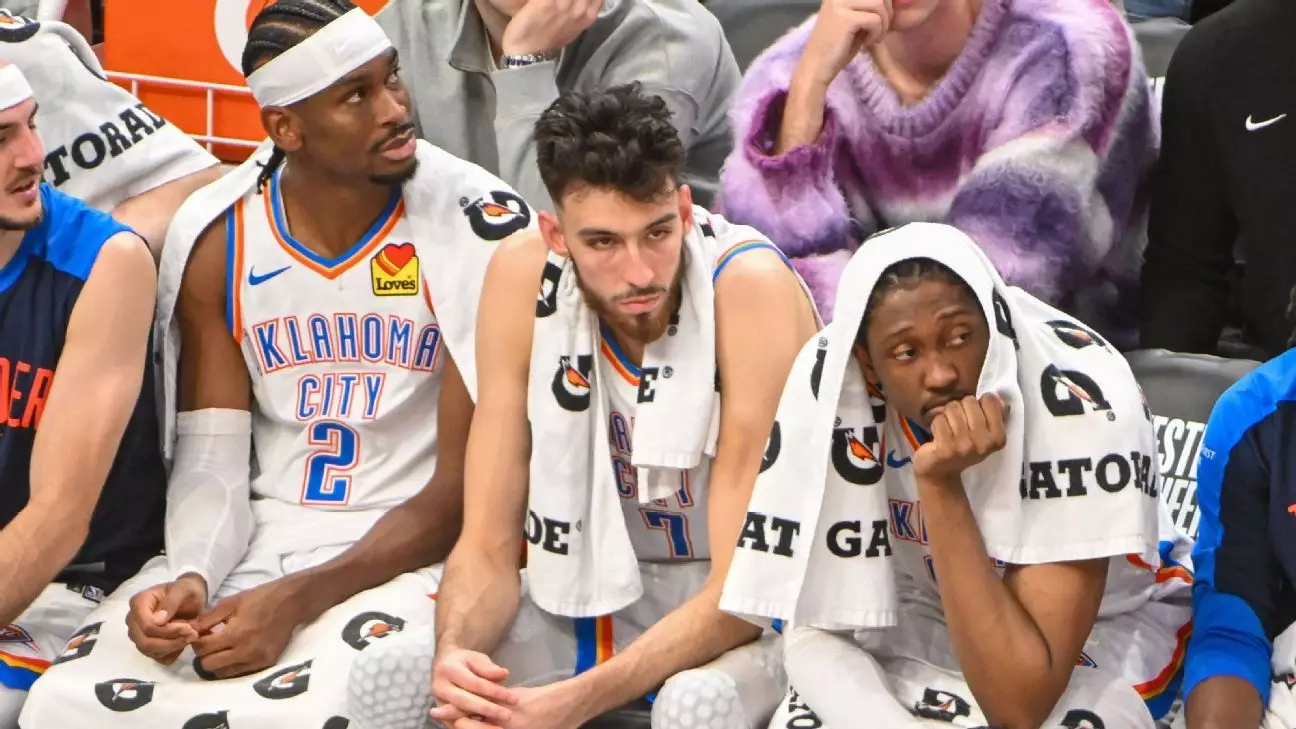What transpired in Minneapolis serves as a stark reminder of the unpredictable nature of playoff basketball—a realm often strewn with unexpected heartbreaks and crushing defeats. The Oklahoma City Thunder faced an agonizing 143-101 setback against the Minnesota Timberwolves, a loss that can only be described as an unmitigated disaster for a team riding high after winning the first two games of the Western Conference finals. This defeat wasn’t just about the numbers; it highlighted a glaring lack of preparedness and response to adversity that can be unforgiving in such a high-stakes environment.
Game 3 offered a thorough exhibition of how teams can seamlessly transition from winners to losers when caught off guard by sheer physicality and relentless aggression. Oklahoma City, perhaps blinded by their initial success, failed to recognize the tenacity with which Minnesota approached the game. The words of power forward Chet Holmgren were painfully clear: “Wherever they wanted to go, they got there.” This is a blatant admission of a failure in execution, strategy, and the fundamental principles of defensive basketball. Such lapses are not merely unlucky; they emerge from a deeper issue of mental fragility that we’ve seen derail numerous NBA hopefuls in the past.
Stars Dimmed and Opportunities Missed
The night served as a harsh wake-up call for Shai Gilgeous-Alexander, whose performance was shockingly subpar. With a mere 14 points—his lowest tally of the season—one must question whether he succumbed to the mounting pressure of the playoffs. This isn’t to discredit Minnesota’s defensive prowess, but to shine a light on whether Oklahoma City’s star players faltered under the weight of expectation. When you witness an elite player struggle to find their rhythm, it raises doubts about the team’s collective resolve when faced with adversity.
And then there’s the broader context. The Thunder’s starters collectively managed a paltry 49 points, a figure that stands in stark contrast to their opponents, who saw their stars—Anthony Edwards and Julius Randle—thrive. This inefficacy isn’t merely a statistical anomaly; it reflects a psychological breakdown when the going gets tough. Oklahoma City transitioned from a powerful offensive unit to a team that simply could not respond to Minnesota’s persistent pressure. What a transformation to witness, and what an eerie representation of a team on the brink of an otherwise promising postseason.
Defensive Disarray and Tactical Miscalculations
From what was supposed to be a repeat of their initial playoff dominance, the Thunder’s defensive strategy crumbled like a house of cards. Allowing the Timberwolves to shoot an alarming 57.3% from the field and a staggering 50% from three-point range is a diagnostic indicator of a team that is scrambling to find its footing. When your defined modus operandi is rooted in defensive solidity, such a performance is unacceptable. Upon review, one can’t help but ponder if the Thunder had become complacent after their initial successes.
That said, even championship-caliber teams have off nights, but the true litmus test lies in how they react. After getting metaphorically “punched in the mouth,” one would expect a seasoned squad to rally and reassess their strategy. Gilgeous-Alexander’s remarks about taking the ball out of the net lend credence to a sentiment echoed by many frustrated fans: how can you establish a rhythm when your defense is subpar?
The Psychological Warfare of Playoff Basketball
This series—and particularly Game 3—exemplifies the psychological battles inherent in playoff basketball. The weight of expectation can crush the spirit of even the most talented teams. As history has shown, the most skilled players are often those who can quickly adapt to adversity. On that fateful night, Oklahoma City appeared rudderless, lacking the grit and tenacity necessary to arise from the ashes of their failure.
It is within the crucible of such playoff intensity that an identity is forged—not just on the court, but within the very psyche of the organization. This is where the Thunder must focus their efforts moving forward. Learning to respond to adversity with resolve rather than despair will determine if this setback is merely a fleeting moment or the beginning of a troubling trend.
In a world where mediocrity becomes a breeding ground for failure, the Oklahoma City Thunder must choose to rise, to learn, and to evolve. Only then can they reestablish themselves as a formidable force in the NBA’s unforgiving playoff landscape.


Leave a Reply